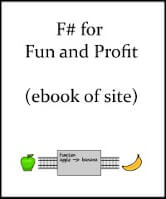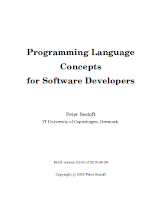Last Updated on December 24, 2022
F# (pronounced F sharp) is a general purpose, strongly typed, multi-paradigm programming language that encompasses functional, imperative, and object-oriented programming methods. F# was modeled on Objective Caml (OCaml), a successful object-oriented functional programming language, and then tweaked and extended to mesh well technically and philosophically with .NET.
F# is most often used as a cross-platform Common Language Infrastructure (CLI) language, but it can also generate JavaScript and graphics processing unit (GPU) code.
F# belongs to the ML family of languages and is ideal for implementing interpreters and compilers because it has datatypes and pattern matching and is strongly typed. This leads to a brevity and clarity of examples that cannot be matched by non-functional languages.
F# is valuable to programmers at any skill level; it combines many of the best features of functional and object-oriented programming styles into a uniquely productive language.
We present our recommended free (to download) books to help you master F#.
1. F# for Fun and Profit eBook by Scott Wlaschin
 This book offers a wealth of information about F# with a whole series of tutorials. There are also many posts about functional patterns, and many worked examples.
This book offers a wealth of information about F# with a whole series of tutorials. There are also many posts about functional patterns, and many worked examples.
The author has compiled all the pages of his site into an ebook using GitBook.
The ebook runs to almost 2,000 pages.
The eBook is available in PDF, ePub and Mobi/Kindle formats.
2. Programming Language Concepts for Software Developers by Peter Sestoft
 Programming Language Concepts for Software Developers takes an operational approach to presenting programming language concepts, studying those concepts in interpreters and compilers for a range of toy languages, and pointing out where those concepts are found in real-world programming languages.
Programming Language Concepts for Software Developers takes an operational approach to presenting programming language concepts, studying those concepts in interpreters and compilers for a range of toy languages, and pointing out where those concepts are found in real-world programming languages.
Topics covered include abstract and concrete syntax; functional and imperative; interpretation, type checking, and compilation; continuations and peep-hole optimizations; abstract machines, automatic memory management and garbage collection; the Java Virtual Machine and Microsoft’s Common Language Infrastructure (also known as .NET); and reflection and runtime code generation using these execution platforms.
The author uses the functional language F# as presentation language throughout to illustrate programming language concepts by implementing interpreters and compilers for toy languages.
Next page: Page 2 – Functional Programming with F# and more books
Pages in this article:
Page 1 – F# for Fun and Profit eBook and more books
Page 2 – Functional Programming with F# and more books
All books in this series:
| Free Programming Books | |
|---|---|
| Ada | ALGOL-like programming language, extended from Pascal and other languages |
| Agda | Dependently typed functional language based on intuitionistic Type Theory |
| Arduino | Inexpensive, flexible, open source microcontroller platform |
| Assembly | As close to writing machine code without writing in pure hexadecimal |
| Awk | Versatile language designed for pattern scanning and processing language |
| Bash | Shell and command language; popular both as a shell and a scripting language |
| BASIC | Beginner’s All-purpose Symbolic Instruction Code |
| C | General-purpose, procedural, portable, high-level language |
| C++ | General-purpose, portable, free-form, multi-paradigm language |
| C# | Combines the power and flexibility of C++ with the simplicity of Visual Basic |
| Clojure | Dialect of the Lisp programming language |
| ClojureScript | Compiler for Clojure that targets JavaScript |
| COBOL | Common Business-Oriented Language |
| CoffeeScript | Transcompiles into JavaScript inspired by Ruby, Python and Haskell |
| Coq | Dependently typed language similar to Agda, Idris, F* and others |
| Crystal | General-purpose, concurrent, multi-paradigm, object-oriented language |
| CSS | CSS (Cascading Style Sheets) specifies a web page’s appearance |
| D | General-purpose systems programming language with a C-like syntax |
| Dart | Client-optimized language for fast apps on multiple platforms |
| Dylan | Multi-paradigm language supporting functional and object-oriented coding |
| ECMAScript | Best known as the language embedded in web browsers |
| Eiffel | Object-oriented language designed by Bertrand Meyer |
| Elixir | Relatively new functional language running on the Erlang virtual machine |
| Erlang | General-purpose, concurrent, declarative, functional language |
| F# | Uses functional, imperative, and object-oriented programming methods |
| Factor | Dynamic stack-based programming language |
| Forth | Imperative stack-based programming language |
| Fortran | The first high-level language, using the first compiler |
| Go | Compiled, statically typed programming language |
| Groovy | Powerful, optionally typed and dynamic language |
| Haskell | Standardized, general-purpose, polymorphically, statically typed language |
| HTML | HyperText Markup Language |
| Icon | Wide variety of features for processing and presenting symbolic data |
| J | Array programming language based primarily on APL |
| Java | General-purpose, concurrent, class-based, object-oriented, high-level language |
| JavaScript | Interpreted, prototype-based, scripting language |
| Julia | High-level, high-performance language for technical computing |
| Kotlin | More modern version of Java |
| LabVIEW | Designed to enable domain experts to build power systems quickly |
| LaTeX | Professional document preparation system and document markup language |
| Lisp | Unique features - excellent to study programming constructs |
| Logo | Dialect of Lisp that features interactivity, modularity, extensibility |
| Lua | Designed as an embeddable scripting language |
| Markdown | Plain text formatting syntax designed to be easy-to-read and easy-to-write |
| Objective-C | Object-oriented language that adds Smalltalk-style messaging to C |
| OCaml | The main implementation of the Caml language |
| Pascal | Imperative and procedural language designed in the late 1960s |
| Perl | High-level, general-purpose, interpreted, scripting, dynamic language |
| PHP | PHP has been at the helm of the web for many years |
| PostScript | Interpreted, stack-based and Turing complete language |
| Prolog | A general purpose, declarative, logic programming language |
| PureScript | Small strongly, statically typed language compiling to JavaScript |
| Python | General-purpose, structured, powerful language |
| QML | Hierarchical declarative language for user interface layout - JSON-like syntax |
| R | De facto standard among statisticians and data analysts |
| Racket | General-purpose, object-oriented, multi-paradigm, functional language |
| Raku | Member of the Perl family of programming languages |
| Ruby | General purpose, scripting, structured, flexible, fully object-oriented language |
| Rust | Ideal for systems, embedded, and other performance critical code |
| Scala | Modern, object-functional, multi-paradigm, Java-based language |
| Scheme | A general-purpose, functional language descended from Lisp and Algol |
| Scratch | Visual programming language designed for 8-16 year-old children |
| SQL | Access and manipulate data held in a relational database management system |
| Standard ML | General-purpose functional language characterized as "Lisp with types" |
| Swift | Powerful and intuitive general-purpose programming language |
| Tcl | Dynamic language based on concepts of Lisp, C, and Unix shells |
| TeX | Markup and programming language - create professional quality typeset text |
| TypeScript | Strict syntactical superset of JavaScript adding optional static typing |
| Vala | Object-oriented language, syntactically similar to C# |
| VHDL | Hardware description language used in electronic design automation |
| VimL | Powerful scripting language of the Vim editor |
| XML | Rules for defining semantic tags describing structure ad meaning |
